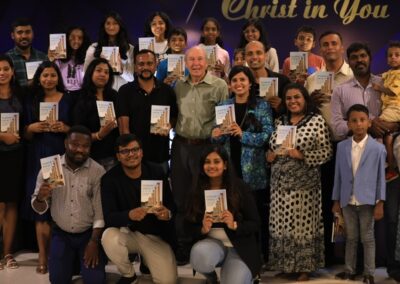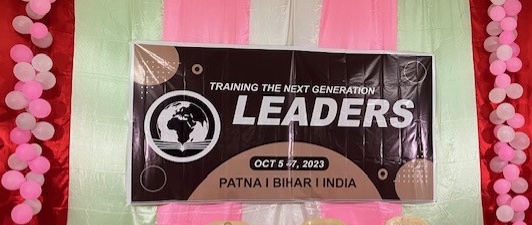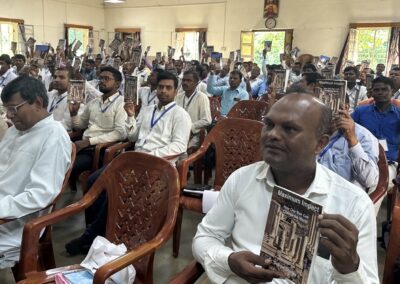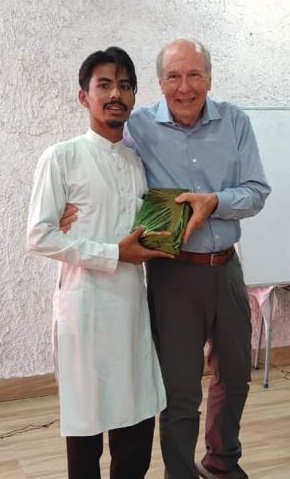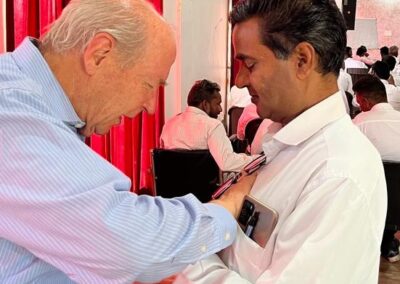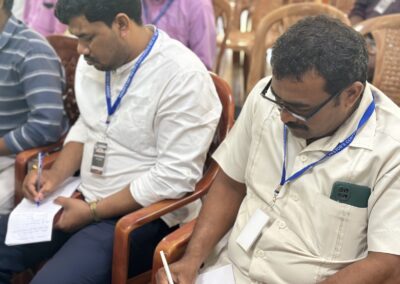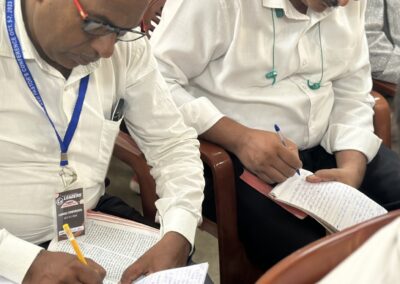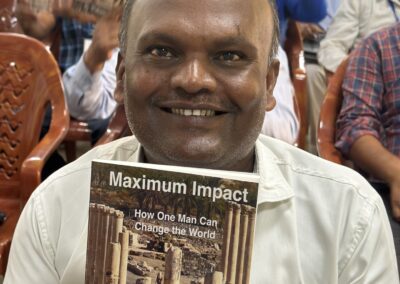Raising up a New Generation of Leaders for Maximum Impact in India
I love India and have always been intrigued by it. I remember that, as a child, I would read article after article in the World Book Encyclopedia, following all the cross-references from one subject to the next – the wildlife from the majestic elephants to the man-eating tigers, the religions from the role of the Hindu priest to Buddha’s enlightenment under the sacred bodhi tree, the caste system from the Brahmins to the untouchables, the construction from the slums to the Taj Mahal – anything Indian. That fascination has led me to the subcontinent more times than I can remember over the past forty-five years.
Over those four and a half decades, I have seen many changes in the country. I remember the Delhi airport as nothing more than a warehouse with a few tables where the customers officers spread out everyone’s suitcases and rambled through them, pulling everything out and then leaving the passengers to figure out how to discreetly repack everything. Plus, I’ll never forget the mentally disturbed (likely demon-possessed) man wandered around the airport wearing nothing except a T-shirt while no security personnel intervened. Today’s modern airports in not only the major cities but also in every region of the country bear no resemblance to the primitive terminals of yesteryear. In addition, the passengers are entirely different. When I first traveled in India, the planes were essentially empty with only a few Westerners aboard. On this trip, the flights were fully booked, and I was usually the only international customer. In addition, the hotels – even the US-based chain hotels – were filled with Indians rather than the international travelers I was accustomed to from previous trips. I no longer see people bathing at the water spigots on the main streets of the cities or trying to drink out of mudpuddles in the road. Nor do I have to wait for cows to amble out of the entranceway before entering an upscale supper club where the elite of society, including top-level government officials gather. Yes, there is still insanely congested traffic, but it is nothing like it was before they divided the lanes prohibiting the drivers from feeling that they have just as much freedom to drive on the right side of the road as on the left where the British taught them to navigate. I’ve witnessed phenominal economic development, tremendous improvements in the standard of living, and amazing technological advancements. One example is the current push toward a cashless society to the point that most of today’s transactions are handled with cell phone transfers and even the street vendors have QR codes posted on their sidewalk stands so the customers can scan in their payments. In fact, the government has even stopped printing large bills since currency is used for only small items.
Yet, on this visit, I witnessed a significant change in one aspect of the society that I found really disturbing – opposition against Christianity. I was originally planning to travel to Manipur State to teach in a seminary, but riots against the Christian population broke out in that area, turning it into a “war zone” with scores of churches and hundreds of Christian homes being burned, thousands of believers being run out of their villages, and – according to some reports – hundreds of Christians being martyred. Of course, my plans were cancelled due to the violence and ongoing instability in the area. However, in the areas of the country that I did visit, I detected a sense of unwelcome. There seemed to be a new tone in the voices of those who asked me why I was visiting their country; rather than a sense of curiosity, their questions conveyed a feeling of suspicion and tended to seem more like an interrogation than a casual conversation. One adamant official in the radical Hindu government that is currently in power made a declaration that he intended to eliminate Christianity from the country by December 31, 2021. Of course, that date has come and gone, and his mission has failed, but some significant steps toward that goal have been accomplished with the elimination of transfers of foreign funds into Indian organization which has caused hundreds of ministries to either close or seriously curtail their operations. There have also been laws enacted that make it illegal to hold church gathering in homes, eliminating the option of shifting to a house church model when the congregations have to move out of their official church buildings. The implementation of anti-conversion laws in many of India’s states has made it illegal to evangelize and for Hindus to willingly become Christians. In addition, there is a strong movement to reconvert believers to their birth religion of Hinduism. To this end, videos of believers denouncing their faith are being widely circulated on social media – even showing officials standing over them with batons, threatening to beat them unless they fully completed their denial of Christianity. The thing that seems so ironic about the whole assault against Christianity is that it is actually the destruction of two things that Indians whole dear – democracy and Hinduism. As the world’s largest democratic state, they are denying the freedom of a significant sector of their population. And, as Hindus who adhere to the principle of ahimsa – the tenet of nonviolence that fueled Mahatma Gandhi’s civil disobedient revolt against the British rule and leads the majority of Indians to be vegetarians rather than killing animals – they have no qualms about beating and even killing Christians. Missionaries, who were once welcomed as the agents of change and improvement in the country are now viewed with suspicion and considered to be perpetrators of an evil and destructive agenda. Thus, many layers of security and anonymity shrouded my visit. My picture and name were omitted from all the announcements inviting the pastors to the meetings. The sessions that were recorded for future distribution or broadcast on social media were in audio only rather than on video unless the ministry had their own private YouTube channel that could only be accessed by viewers who were invited to join the broadcast.
My mission to India got off to an unexpected “jumpstart” when an Indian friend who is now living in Chicago emailed me asking when I would be in Bangalore because his relatives are from there and he used to live there before coming to the USA. Since I was in a rush when I received his request, I simply sent him the whole itinerary rather than taking the time to specifically answer his question about that particular portion of my trip. When he saw that I had a long layover in Chicago, he asked if he could meet me at the airport. I agreed and met him for lunch. It turned out that he had some problems that he wanted to talk through. We ended our time together with his tearfully remark that he wanted to honor me as the only person who has ever “been there” for him.
Our partner ministries in India had shared with me that they had lost between fifteen and twenty percent of their leadership to COVID during the pandemic. Now, they are focused on raising up new recruits to continue their ministries. Therefore, they were eager for me to help train their potential leadership. Following one of the basic principles of my Maximum Impact book which was the focus of this trip, I crisscrossed the nation, stopping in cities of significance to the different religions of the country and of influence in various sectors of society.
My first assignment once I actually arrived in India was a pastors’ and leaders’ conference with one hundred thirty-seven delegates in the city of Patna in north India. Situated on the shore of sacred Ganges River where Hindus feel that they have access to eternal bliss if they are cremated on its banks and their ashes scattered overt its waters and located only a few miles from the site of Sidharth Gautama’s transformation into the Buddha, this city carries great significance to two of the religions that were birthed in the country. I didn’t promise the delegates at the conference eternal bliss or enlightenment, but I do believe that they were all empowered to take their ministries to a new level through applying the biblical principles I shared from my study on the ministry of the Apostle Paul, the subject Maximum Impact, the book that I presented to each of them.
My next assignment was to preach in a church in the city of Chandigarh what has the unique distinction od serving as the capital of two different states – Punjab and Haryana. At the church in Chandigarh, I discovered that at least one of the principles that I had shared at the pastors’ conference was already being implemented – having a Christian witness in areas of significant influence. One young lady in the congregation is actively pursuing the position of magistrate in her state of Punjab, an area where the government has enacted severe measures against Christians. One of the young men in the congregation works in the movie industry and has made unusually strategic contacts with leaders in Bollywood which is a major “player” in shaping the worldview and impacting the values of the new generation of Indians.
Next, I traveled to the city of Amritsar, home of the Golden Temple – the epicenter of the Sikh religion, another of India’s ingenious faiths, famous for the colorful turbans worn by its adherents. There, I met Amit, a long-time ministry partner with whom I have traveled to many parts of the country on previous missions to India. He took me to a Christian retreat center outside the city which is the life’s work of a very dedicated Christian family. When the parents became believers some thirty years ago, their whole family was living in just one room, but God gave them a vision of raising up a ministry within their community; so, they invested what little they had and the pension that the father received when he retired from his janitorial position into opening a church which today is a campus nestled in “bread basket of India” where the fertile plains serve half the year as the rice paddies and the rest of the year as the wheat fields supplying the bulk of India’s sustenance. The compound boasts of two auditoriums, a dining pavilion, and dormitories that will house about a hundred and twenty guests. All these facilities are beautifully constructed with modern amenities and are fully air-conditioned. All three sons have completed graduate degrees in theology with the intention of opening a Bible college in the facility. Until that vision comes to fruition, they host short training seminars for area pastors and church leaders at their compound – hence, my invitation to teach the ninety-seven delegates who were gathered to be trained in the principles of Maximum Impact. In addition to giving each delegate a copy of the book, I was also able to present them with a free download of a Bible app for their cell phones which enabled them to access the Bible, the Jesus Film, and several other valuable resources in their native dialect as well as in English.
While a guest at the retreat center, I became the “victim” of the most lavish hospitality imaginable. We began the first night with a virtual banquet in which course after course – each more delectable than the last – kept coming out of the kitchen. When the food finally stopped piling up on the table, our host announced that it was time for us to leave to go to another home, where yet another banquet had been prepared for us. The next morning began with a luscious tray of fresh fruit, which seemed like a wonderful breakfast in itself, but soon the table began to fill up with a spiced rice dish, a chicken entree made with peppers, onions, and a delicious sauce, egg sandwiches, and additional fruits. After theses incredible meals, I told the pastors attending the conference that I felt like one of the characters in the Parable of the Prodigal Son – not the wayward son, nor the jealous elder brother, or even the loving father – the fatted calf!
After being stuffed at the second banquet the previous night, I was called upon to share an impromptu message. Noticing that one of the guests was wearing a T-shirt with the slogan “Impossible is nothing,” pulled out the mental notes from the sermon I preached at the church on the previous Sunday, “Nothing is impossible,” based on Luke 18:27, The things which are impossible with men are possible with God. Having shared my heart with the gathering, I was placed on the back of a motorcycle and rushed through the winding streets, barely wide enough to accommodate the two-wheeler. We reached the compound just minutes before the heavens filled with lightning and opened up to dump a horrific deluge upon us. The raging winds blew down trees outside the retreat center’s walls but did no damage inside the compound other than knocking out the power for the night. I fell asleep to the sound of the pounding rain on the roof; yet awoke to a tranquil morning. As powerful as the storm was, the following morning’s atmosphere was perfectly calm and the sun was shining in its full brilliance, leaving no hindrance for the delegates to come to the seminar.
After a full day of ministry, I was ready for an early bedtime, and, when a knock at my door, I thought it was the invitation to dinner, but it was only teatime, and dinner and bedtime didn’t happen for another three hours. The daughter-in-law and her daughter (about four years old) of the gentleman who founded the retreat center had birthdays within the next couple of days; so, they were planning a birthday party for them. Over the course of the next couple hours, neighbors, church members, and extended family began to show up. Finally, at eight o’clock, we all gathered in the sanctuary for a full-fledged church service with about an hour of singing, several prayers, and a sermon by me – which I knew nothing about until they called me up. Drawing on an experience from my childhood I shared the story of the “birthday offering box” at our church – a small wooden chest with a little bell mounted inside that rang with each coin that was dropped into the slot on the top. The children all delighted in making their offerings after each birthday, proudly counting out the number of years with each coin. Some adults even enjoyed dropping in their coins – though they found a way to release them all at once so no one could calculate their age. Trying to relate to both the child and her mother, I stressed the importance each year of life that we have the opportunity to count and celebrate. At nine thirty, we went out to the dining hall for dinner. I no problem falling asleep when I finally got the chance, ending this leg of my mission – but not my ministry in that all the pastors begged me to come back for a longer training period – three or four days, or even a week!
My next stop was in Bangalore – the technology center of India, and likely the world. When I first started traveling to India, Bangalore was not a city that was on anyone’s “radar.” But the technology revolution changed all that, turning it into one of the most significant and strategic cities in the technology industry. It has boomed from a population of two and a half million in 1978 when I first visited India to home of nearly fourteen million with a growth rate of about half a million each year that it is today. This sprawling metropolis is also home to more technology companies than can be counted, the hub for international travelers, entrepreneurs, businessmen, and investors – placing it at the top of my list of cities where I wanted to share the principles of Maximum Impact. When a pastor from the city joined my ZOOM discipleship group, I knew that the Lord had answered my prayer; so, I eagerly arranged to hold a one-day seminar at the start-up ministry. About eighty delegates – almost all recent converts from Hinduism – hung on to every word of the teaching and celebrated when I distributed copies of the book for their further study. The church pledged to become monthly supporters of the ministry of Teach All Nations and made me promise to come back again next year.
My final stop on this two-week odyssey across India was in Hyderabad, a cosmopolitan city of close to eleven million inhabitants, known as the global center for trade of rare diamonds, emeralds, and natural pearls in addition to being a cultural, commerce, and industry center for the nation. In addition, it is also the homebase of two of the ministry partners that Teach All Nations works with in India – Charis Bible College and Global Action Ministries. I was able to spend quality time with the leadership of both ministries and strategize how we can team up for future ministry not only in India but also reaching into the bordering countries. One unexpected result of this collaboration was the discovery that all of us shared a common interest in publishing and distributing training materials in Nepal. We spent time calculating how to merge our efforts in order to accelerate each ministry’s vision with a major component being the completion of the vision Teach All Nations has been working toward of establishing libraries through the nation of Nepal. In addition, I granted the request of both of our ministry partners to translate and publish more of our books.
At Charis Bible College, I was invited to teach a series of classes over a three-day period with a packed classroom, a closed-circuit connection to the overflow auditorium, and ZOOM link to the campuses Chennai, Mumbai, and Delhi plus all the school’s online students throughout the nation. After each class, I spent time praying personally with each student who had a special need, including one who had traveled three hundred kilometers around a hundred and ninety miles) to be in the meeting. During the breaktimes, I was thrilled to reconnect with students and staff whom I had met on previous trips to the campus. They all amazed me with their ability to recall in detail the lessons and stories I had shared even though it had been several years since my last visit.
Sunday morning afforded me the opportunity to minister in the church of a pastor I had met on a previous mission to the city. Prior to the service, I sensed an urge to change the message that I had come to deliver. After preaching and praying for scores of the congregation’s members, I accompanied the pastor and his wife to their home for lunch. As we were enjoying a delicious meal of biryani, the pastor turned to me and said, “That message you shared this morning was exactly what the Lord has been speaking to me for the past couple days” – confirmation that my ministry in India was divinely orchestrated.
Prior to heading to the airport on Monday, I had one final opportunity to visit the offices of both Charis Bible College and Global Action Ministries and to have devotions with their staff members, to encourage them and leave them with one final challenge to raise up a new generation of leaders for maximum impact in their nation.

